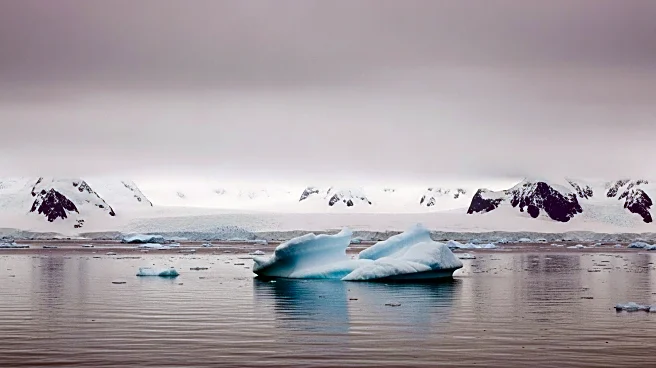What is the story about?
What's Happening?
Antarctica is experiencing a significant decline in sea ice, with recent data showing a dramatic reduction since 2016. Historically, Antarctic sea ice expanded slightly, contrasting with the Arctic's steady decline. However, recent observations indicate a reversal, with the 2025 winter maximum reaching only 17.81 million km², significantly below the 1981-2010 average. This decline is attributed to changes in wind patterns, salinity, and ocean stratification, which may signify a climate tipping point. The reduction in sea ice exposes the ocean to more sunlight, amplifying warming and threatening ecosystems, including species like emperor penguins and krill. The potential destabilization of the West Antarctic Ice Sheet could lead to significant sea-level rise.
Why It's Important?
The decline in Antarctic sea ice has profound implications for global climate systems. The Southern Ocean plays a crucial role in absorbing Earth's excess heat and carbon dioxide. Changes in sea ice and ocean circulation could release this heat into the atmosphere, disrupting weather patterns worldwide. The loss of sea ice also threatens marine ecosystems and could lead to the destabilization of ice sheets, resulting in significant sea-level rise. This situation underscores the urgent need for global collaboration to reduce greenhouse gas emissions and protect vulnerable ecosystems. The potential tipping point in Antarctica could accelerate global warming, making it a critical area of concern for climate scientists and policymakers.
What's Next?
Scientists emphasize the need for rapid emission cuts and resilience planning to prevent further destabilization of the Antarctic environment. Continuous monitoring and improved climate models are essential to understand and predict changes in sea ice behavior. International efforts, such as the International Polar Year, aim to coordinate research and data sharing to address these challenges. Coastal communities worldwide must prepare for potential sea-level rise and increased storm activity. The scientific community continues to debate whether a true tipping point has been crossed, but the evidence suggests that the Antarctic sea-ice system has entered an unprecedented state, requiring immediate attention and action.
Beyond the Headlines
The decline in Antarctic sea ice highlights the interconnectedness of global climate systems. The potential feedback loops between sea-ice melt, ocean warming, and circulation changes could have long-term impacts on global weather patterns and marine ecosystems. The situation raises ethical and environmental concerns about the responsibility of nations to address climate change and protect vulnerable regions. The loss of sea ice also poses logistical challenges for Antarctic research stations, affecting resupply and transport operations. The need for sustained observations and data sharing is critical to understanding and mitigating the impacts of these changes.


















